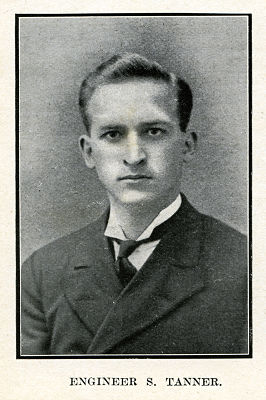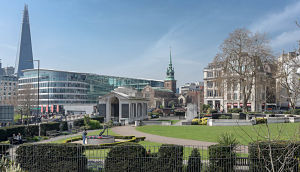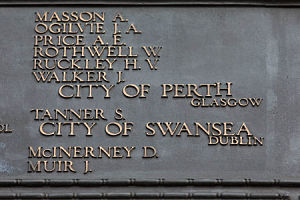WW1 Marine Engineer Samuel Tanner
Samuel Tanner was born on 7th August 1894 to Joseph and Florence Tanner who had three sons and three daughters. Samuel was the third of the six children.
In 1904 the family moved to Bell Road, Remuera and Samuel attended Remuera School. [1] He won a Junior Free Place to attend Auckland Grammar School in 1909. [2]
He was a good swimmer and won the Under 16 years 50 yards’ handicap race of the School swimming sports in 1910. Samuel then spent five years as an apprentice at George Fraser and Sons’ foundry in Stanley Street, and in September 1916 passed exams as a third-class marine engineer and first-class oil engineer. He had also attended evening classes in engineering at Mr J W Bower’s school in Custom’s Street.
He left New Zealand on transport duty in November 1916, and upon arriving in London joined as fourth engineer in the transport, and went in the City of Perth to Egypt. It was on the return voyage that the vessel was torpedoed on the 11th June 1917 at 8.11pm near Land’s End by a German submarine. [3] Along with Samuel Tanner, seven other men, all from India, died. No one outside the engine room was lost. Samuel Tanner was 22 years old. He was lost with the ship and his life is commemorated on the Tower Hill Memorial to the officers and men of the Merchant Marine and Fishing Fleets who were lost at sea in both World Wars. [1]
Samuel Tanner is also remembered on the Remuera Primary School memorial gates and on the Auckland Grammar School World War One memorial.
IN A TORPEDOED SHIP. REMUERA BOY’S DEATH.
Details have been received by Mr and Mrs Joseph Tanner, of Remuera, of the circumstances connected with the death of their eldest son, Samuel Tanner, who was fourth engineer mi (the City of Perth when that vessel was torpedoed near Land’s End. A letter has just been received from Mr Colin Forbes, third engineer, stating that the ship was struck in the engine room at 8.11 p.m. on June 11. He adds: “As I belong in the Bluff Southland, New Zealand, and was third engineer on the City of Perth, it was but natural your son and I hit it all right. We had made a compact if we got through to stick together, but it was willed otherwise. The poor boy never had a chance for his life. He had just taken over the watch and by information from the greaser who was attending the steering engine, Sam had just gone to draw some water for one of the men, when the torpedo struck the ship practically where he stood. By the time I got to the engine room, which I estimate at about six seconds, the water was knee deep on the platform, and I could do nothing. Not one of the men on the watch below escaped. The torpedo must have blown in the side of the ship, and the boilers exploding at the same time, completed the foul work. A more manly and straightforward boy I have never met than Sam, and how he used to talk about home and mother! He had a lot of silk things to send home when the ship arrived at London.”
(He) was born at Tauranga in 1894, educated at Remuera District School and the Auckland Grammar School, he afterwards spent five years at Fraser and Sons’ foundry, Stanley Street, and in September last passed at Auckland as third-class marine engineer and first-class oil engineer. He had, while at Fraser’s, attended evening classes in engineering at Mr Bower’s school. He left New Zealand on transport duty last November, and upon reaching London joined as fourth engineer in the transport, and went in that vessel to Egypt. It was on the return voyage that the vessel was torpedoed near Land’s End. A letter from his chief speaks well of the training deceased had received in Auckland. It was as follows: “he never gave me one moment’s uneasiness. He knew his work well.” [4]
TANNER.-In loving memory of Fourth Engineer Samuel Tanner, and the seven brave men who were killed with him while on duty through the torpedoing of the British Transport, City of Perth, near England. June 11. 1917.
Oh when we mourn for those we’ve lost.
And read of battles lost and won.
There’s naught on earth can pay the cost.
Or give mothers back their sons.
He unto Himself has taken these.
Not to their loss, but to their vast increase.
To us the loss, the emptiness, the pain.
But unto them all high eternal gain.
Inserted by his loving parents, brothers and sisters. [5]


